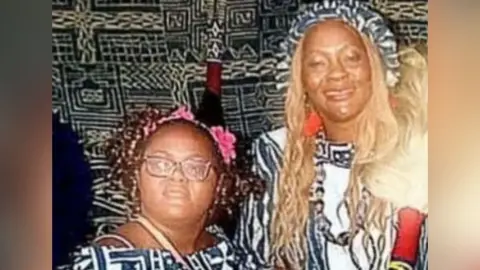The tragic story of Alphonsine Djiako Leuga and her 18-year-old daughter, Loraine Choulla, raises profound questions about community vigilance and the failure of social systems. In May 2023, the pair were discovered deceased in their home in Radford, Nottingham, leading to widespread shock and outrage as to how they could remain unnoticed for months. Their situation highlights significant lapses in social service oversight and community engagement, posing critical inquiries about the responsibilities of authorities and individuals alike.
Alphonsine, 47, originally from Cameroon, had been living in the UK since 2016, having moved from Italy with her two daughters, one of whom, Loraine, had Down’s syndrome and required care. Despite their known vulnerabilities and connections to social services, the pair became isolated, ultimately lying undetected in their home. Residents in their community expressed deep regret and frustration about how such a tragic event could transpire, revealing the discomforting truth that they might have overlooked critical signs and needs from their neighbors.
As the investigation unfolded in Nottingham Coroner’s Court, friends and local community members began reflecting on their experiences with Alphonsine and Loraine. A friend recounted meeting Alphonsine shortly after she arrived in the UK, describing it as a time of desperation where she felt compelled to help a fellow Cameroonian by providing shelter. This initial camaraderie, however, did not translate into ongoing support as both women became more reclusive.
Alphonsine’s outreach to the community dwindled over time, with reports illustrating how the family struggled with basic necessities, including heating and food, particularly during the cold winter months. Local residents noted a deterioration in the condition of their home and physical appearance, which went largely unaddressed. For instance, one shopkeeper fondly remarked on their dynamic in earlier years, noting Alphonsine’s generous nature despite her struggles, which became overshadowed by a growing reluctance to engage with social services and community resources.
Compounding the challenges faced by Alphonsine and Loraine was the gradual disintegration of their relationships with social services. In 2021, Alphonsine began declining visits, resulting in her gas supply being capped. Without access to both heating and social assistance, their living conditions deteriorated significantly. Concerned locals never fully grasped the extent of their situation, partly due to the familial bond and the particular needs surrounding Loraine’s disability, which heightened dependency on her mother and limited her ability to seek help.
One neighbor, Deborah Williams, who lived adjacent to them, noted the visible signs of neglect but did not perceive the extent of the danger. At the fore of her observations, she cherished memories of seeing the mother and daughter enjoying life and engaging with community activities. Yet, by early 2024, the state of their home had worsened, leading to missed chances for intervention by authorities. Social services made inquiries about their whereabouts but left as they presumed the home was empty.
Tragically, on February 2, 2024, in a desperate plea for help, Alphonsine called emergency services only to have her call misclassified, preventing any timely response. She passed away due to pneumonia within days, leaving Loraine—who relied entirely on her mother—to navigate her fate alone. The latter’s death followed weeks later from malnutrition and dehydration, forcing the community to grapple with feelings of deep guilt, anger, and disappointment over their collective failure to act.
The aftermath of this heartbreaking story has ignited conversations around shared responsibility within the community, emphasizing that neglect to engage with neighbors can have dire repercussions. Local shop owner Jamil Ellahi expressed how everyone in the vicinity bore part of the blame for failing to connect with Alphonsine and Loraine, urging for a greater sense of community awareness and proactive support for vulnerable members.
The case has sparked calls for reform in social service policies and community strategies designed to enhance safety nets for disabled individuals and their caregivers, ensuring that no one falls through the cracks. As discussions continue, the lingering question remains: How can a community collectively prevent such a tragedy from recurring in the future?












